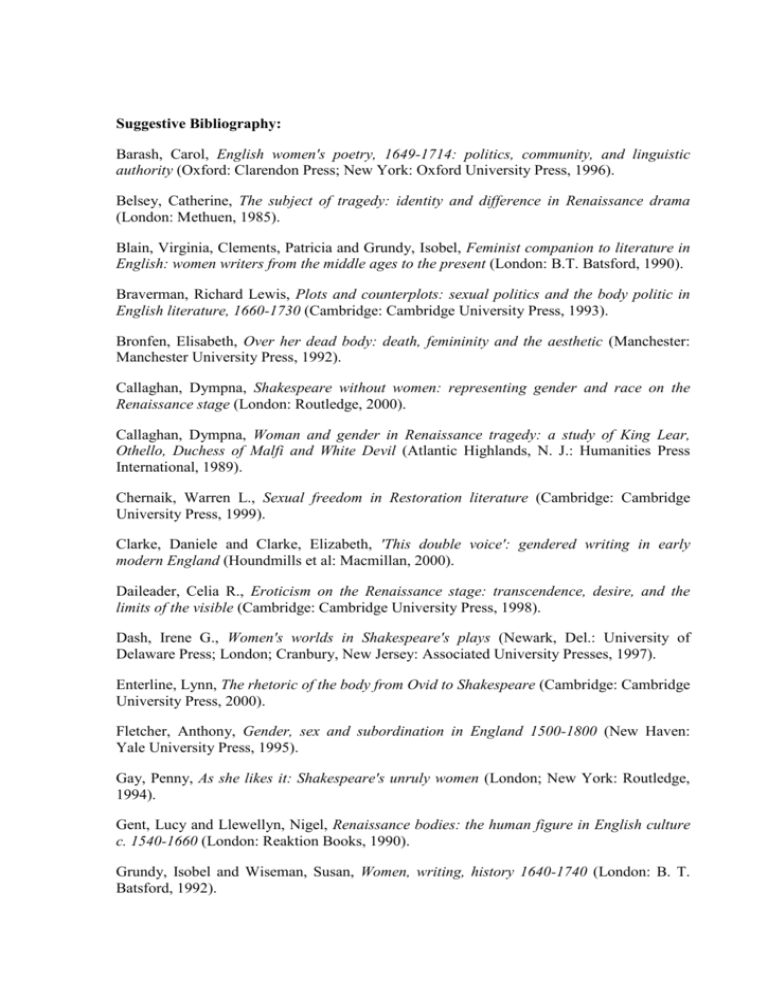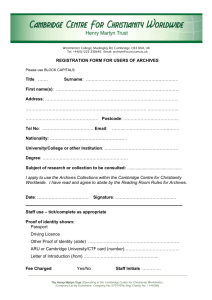
Suggestive Bibliography:
Barash, Carol, English women's poetry, 1649-1714: politics, community, and linguistic
authority (Oxford: Clarendon Press; New York: Oxford University Press, 1996).
Belsey, Catherine, The subject of tragedy: identity and difference in Renaissance drama
(London: Methuen, 1985).
Blain, Virginia, Clements, Patricia and Grundy, Isobel, Feminist companion to literature in
English: women writers from the middle ages to the present (London: B.T. Batsford, 1990).
Braverman, Richard Lewis, Plots and counterplots: sexual politics and the body politic in
English literature, 1660-1730 (Cambridge: Cambridge University Press, 1993).
Bronfen, Elisabeth, Over her dead body: death, femininity and the aesthetic (Manchester:
Manchester University Press, 1992).
Callaghan, Dympna, Shakespeare without women: representing gender and race on the
Renaissance stage (London: Routledge, 2000).
Callaghan, Dympna, Woman and gender in Renaissance tragedy: a study of King Lear,
Othello, Duchess of Malfi and White Devil (Atlantic Highlands, N. J.: Humanities Press
International, 1989).
Chernaik, Warren L., Sexual freedom in Restoration literature (Cambridge: Cambridge
University Press, 1999).
Clarke, Daniele and Clarke, Elizabeth, 'This double voice': gendered writing in early
modern England (Houndmills et al: Macmillan, 2000).
Daileader, Celia R., Eroticism on the Renaissance stage: transcendence, desire, and the
limits of the visible (Cambridge: Cambridge University Press, 1998).
Dash, Irene G., Women's worlds in Shakespeare's plays (Newark, Del.: University of
Delaware Press; London; Cranbury, New Jersey: Associated University Presses, 1997).
Enterline, Lynn, The rhetoric of the body from Ovid to Shakespeare (Cambridge: Cambridge
University Press, 2000).
Fletcher, Anthony, Gender, sex and subordination in England 1500-1800 (New Haven:
Yale University Press, 1995).
Gay, Penny, As she likes it: Shakespeare's unruly women (London; New York: Routledge,
1994).
Gent, Lucy and Llewellyn, Nigel, Renaissance bodies: the human figure in English culture
c. 1540-1660 (London: Reaktion Books, 1990).
Grundy, Isobel and Wiseman, Susan, Women, writing, history 1640-1740 (London: B. T.
Batsford, 1992).
Harvey Elizabeth D. and Maus Katharine Eisaman, Soliciting interpretation: literary theory
and seventeenth-century English poetry (Chicago: The University of Chicago Press, 1990).
Hinds, Hilary, God's Englishwomen: seventeenth-century radical sectarian writing and
feminist criticism (Manchester; New York: Manchester University Press; New York: St.
Martin's Press, 1996).
Howard Jean Elizabeth and Rackin Phyllis, Engendering a nation: a feminist account of
Shakespeare's English histories (London; New York: Routledge, 1997).
Hutson Lorna, The usurer's daughter: male friendship and fictions of women in sixteenthcentury England (London: Routledge, 1994).
Keeble, N. H., The cultural identity of seventeenth-century women: a reader (London:
Routledge, 1994).
Kegl, Rosemary, The rhetoric of concealment: figuring gender and class in Renaissance
literature (Ithaca, New York: Cornell University Press, 1994).
Laqueur, Thomas Walter, Making sex: body and gender from the Greeks to Freud
(Cambridge, Mass.: Harvard University Press, 1990).
Lerner, Gerda, The creation of feminist consciousness: from the Middle Ages to eighteenseventy (New York: Oxford University Press, 1993).
Lyons, Paddy and Morgan, Fidelis, Female playwrights of the Restoration: five comedies
(London: J.M. Dent, 1991).
Masten, Jeffrey, Textual intercourse: collaboration, authorship, and sexualities in
Renaissance drama (Cambridge: Cambridge University Press, 1997).
McCormick, Ian, Secret sexualities: a sourcebook of 17th and 18th century writing
(London; New York: Routledge, 1997).
McMullan, Gordon, Renaissance configurations: voices / bodies / spaces, 1580-1690
(Houndmills: Macmillan; New York: St. Martin's Press, 1998).
Morgan, Fidelis, Female wits: women playwrights on the London stage 1660-1720 (London:
Virago, 1981).
Orgel, Stephen, Impersonations: the performance of gender in Shakespeare's England
(Cambridge: Cambridge University Press, 1996).
Pacheco, Anita, Early modern women writers: 1600-1720 (London: Longman, 1998).
Pearson, Jacqueline, Prostituted muse: images of women & women dramatists 1642-1737
(New York: St. Martin's Press, 1988).
Pitkin, Hanna Fenichel, Fortune is a woman: gender and politics in the thought of Niccolo
Machiavelli (Berkeley: University of California Press, 1984).
Plasa, Carl and Ring, Betty Joan, The discourse of slavery: Aphra Behn to Toni Morrison
(London: Routledge, 1994).
Rose, Mary Beth, The expense of spirit: love and sexuality in English Renaissance drama
(Ithaca, New York: Cornell University Press, 1988).
Rosenthal, Laura Jean, Playwrights and plagiarists in early modern England: gender,
authorship, literary property (Ithaca, New York: Cornell University Press, 1996).
Rubik, Margarete, Early Women Dramatists 1550-1800 (New York: St. Martin’s Press,
1998).
Runge, Laura L., Gender and language in British literary criticism, 1660-1790 (Cambridge:
Cambridge University Press, 1997).
Sedgwick, Eve Kosofsky, Between men: English literature and male homosocial desire
(New York: Columbia University Press, 1985).
Stone, Lawrence, The family, sex and marriage in England, 1500-1800 (New York: Harper
& Row, 1977).
Stone, Lawrence, The family, sex and marriage in England, 1500-1800 (London: Penguin,
1979).
Todd, Janet, Aphra Behn (London: Macmillan, 1999).
Traub, Valerie, Kaplan, M. Lindsay and Callaghan, Dympna, Feminist readings of early
modern culture: emerging subjects (Cambridge: Cambridge University Press, 1996).
Velissariou, Aspasia, Female sexual transgression in Jacobean tragedy (Athens: National
and Kapodistrian University of Athens, 2002).
Wall, Wendy, The imprint of gender: authorship and publication in the English renaissance
(London: Cornell University Press, 1993).
Weber, Harold, Restoration rake-hero: transformations in sexual understanding in
seventeenth-century England (Madison, Wisconsin: University of Wisconsin Press, 1986).
Whigham, Frank, Seizures of the will in early modern English drama (New York:
Cambridge University Press, 1996).
White, Paul Whitfield, Marlowe, history and sexuality: new critical essays on Christopher
Marlowe (New York: AMS Press, 1998).
Williams, Andrew P., The image of manhood in early modern literature: viewing the male
(London: Greenwood Press, 1999).
Young, Douglas M., The feminist voices in Restoration comedy: the virtuous women in the
play-worlds of Etherege, Wycherley and Congreve (New York: University Press of
America, 1997).
Zimmerman, Susan, Erotic politics: desire on the Renaissance stage (New York: Routledge,
1992).







